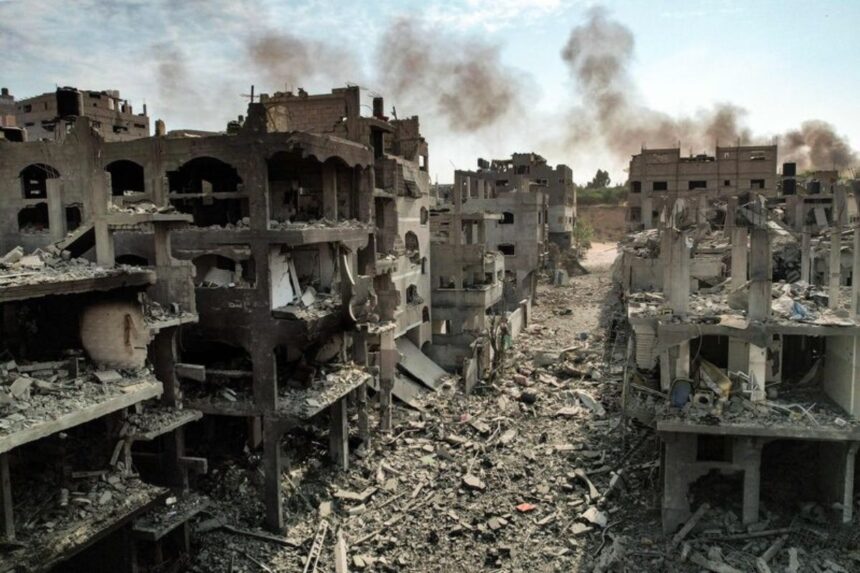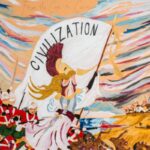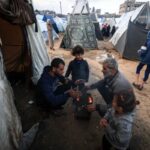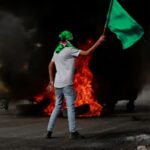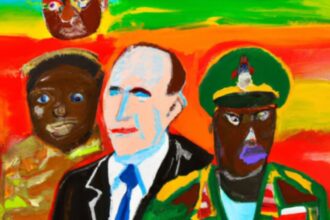On 7 October 2023, Palestinian armed groups in Gaza Strip started a military operation that sadly killed 1,300 Israelis, 100-150 kidnapped, and hundreds were injured, according to the Israeli authorities. The Israeli Defence Forces (IDF) responded with a retaliatory operation in Gaza, resulting in a tragic toll; over 3,478 dead, 70% were women and children, over 1000 children were killed, and 12,500 were injured. The IDF issued a 24 ultimatum forced displacement transfer of civilians in North Gaza, including the evacuation of 22 operational hospitals. On 17 October 2023, Al Ahli Baptist was bombed, resulting in the devastating death of over 1000 civilians, in what Doctors Without Borders (MSF) described as a massacre.
We write as a collective of grassroots feminist global health chapters in response to the unprecedented scale of violence, violation of the International Humanitarian Law (IHL), disproportionate use of power and horrifying targeting of healthcare workers, facilities, and civilians in Gaza. We are writing to challenge the existing narrative and build collective feminist voices and unconditional solidarity with healthcare workers in Gaza.

Yes, there are rules of war
We understand that we don’t live in a perfect world and wars do exist. But even wars are governed by rules of war that should always be respected and adhered to, by all conflicting parties, as illustrated in the Geneva Conventions. As stated in IHL, the principle of proportionality “prohibits attacks against military objectives which are “expected to cause incidental loss of civilian life, injury to civilians, damage to civilian objects, or a combination thereof, which would be excessive in relation to the concrete and direct military advantage anticipated”. Accordingly, the conflicting parties should adhere to the proportionate use of power, and disproportionate use of power is a violation.
What we witnessed in the last 10 days was an overwhelming overuse of power by the IDF towards healthcare workers, health facilities, patients and Palestinian civilians. According to the Israeli Air Force, around 6,000 bombs were thrown over Gaza during the first six days, one of the most densely populated areas. In addition, it bombed a hospital using the internationally prohibited white phosphorus. Healthcare.
The IDF cut off water, food, fuel, electricity, and access to medicine in Gaza, which had an already fragile and donor dependent health system dealing with shortage of medicines and medical supplies. Denial of humanitarian assistance is a violation to the IHL. Tons of convoy assistance that have been waiting for the last 5 days at Rafah Passage have been denied access. In fact, the Rafah passage itself was hit by the IDF four times in the last week, suggesting the potential targeting of unauthorized humanitarian assistance.
The international community’s silence on the disproportionate use of violence and unprecedented attacks on health, healthcare workers and facilities is deafening. This created a new astonishing benchmark for tolerating massacres and devaluing IHL, ethical, and humanitarian values. This can have severe consequences on what future violence and wars may look like.

FRI., OCT. 13: PALESTINIANS FLEEING FROM NORTHERN GAZA TO THE SOUTH AFTER THE ISRAELI ARMY ISSUED AN UNPRECEDENTED EVACUATION WARNING TO A POPULATION OF OVER 1 MILLION PEOPLE IN NORTHERN GAZA AND GAZA CITY.HATEM MOUSSA/AP.
Challenging The global narrative
There is always a debate that global health is meant to be a technical field and that we should avoid engaging in politics, but the field of global/humanitarian health is inherently political with colonial roots. Attempts to depoliticise global and humanitarian health is in itself a political position that accepts the status quo and delegitimizes any challenge to the current inequalities. Our trials to advocate for health equity mandate direct and fierce unapologetic engagement with political drivers, history, and colonial legacies.
With that, it is important to acknowledge the truth that the Palestinian health system has been functioning under decades of systematic oppression and settler colonial apartheid reality. We call for authentic solidarity with healthcare workers and refuse advocacy and solidarity statements that won’t engage with the colonial history and apartheid practices in Palestine, and the profound impact on health and health systems.
In a time where discussions about decolonisation of both humanitarian action and global health, increased after the World Humanitarian Summit Localisation Commitments, we are deafened by the silence of decolonisation voices towards Palestine and the double standards that the international community is holding. We are surprised to see these discussions stuck at frameworks, seminars, principles and charters, with minimal space for walking this talk. We feel that the decolonisation agenda is used as a delaying tactic to actual enforcement, engagement and implementation of decoloniality in our work. In this space, we are fully aware of our responsibility as global health activists from the global south to regain and own the decolonisation agenda, a reason why we write here and reclaim this territory. Needless to say, supporting civilians and healthcare workers is not a political act. It is the core of the humanitarian response. However, refusing to protect civilians and standing on the fence is extremely political.
Conditional and late solidarity legitimising massacres
In the last few days, we came across calls from western organisations for Gaza to condemn Hamas as a pre-condition for solidarity with them. Solidarity exceptionalism, where we have seen wide solidarity with occupation resistance with Ukraine and multiple other occasions, but not for Palestine dehumanization of palestinians- and racilaised solidarity.
The late solidarity legimitimsed the use of further violence and escalations. The late solidarity is as dangerous as no solidarity at all and will cost, as our colleagues in the Palestinian Red Crescent Society rightly stated.

This solidarity should have come very early, based on the well-evidenced trends of Israeli targeting of health healthcare workers and facilities that present a systematic trend, not an ad-hoc response or a collateral damage. In the previous assaults, 180 strikes were carried out against medical facilities, killing 41 medics and healthcare workers, in a health system that is at a breaking point, as stated by the World Health Organisation (WHO).
Disappointed in our own allies
We are writing because of disappointments in our global health allies and feminist movements that showed full detachment from disproportionate bombing of civilians and direct targeting of healthcare workers in Gaza. Preserving the status quo and prioritising the self-interest of the global health movement to act in solidarity with Palestine. Similarly, at this moment, the global movement failed us.
After ten days of complete silence from major global health, health equity, and feminist organisations, we witnessed today with an influx of statements issued today – 18 October – in what appears to be staged or fake solidarity, manifested in statements with no actual engagement, value, condemnation or even calls. Statements full of words such as the Middle East to avoid directly mentioning Gaza. We came across washed down statements from any condemnation of Israel’s denial of humanitarian assistance and the order to evacuate 1.2 million civilians in Gaza (Until 19 October).
Call for immediate action and accountability
We call for all feminist movements, global health, and human rights organisations to speak up in solidarity with healthcare workers in Gaza. We urge them to follow their values and principles rather than self-interest.
We call on the protection of healthcare workers, facilities, and capital, under IHL.
We call on all donors to support and not punish, defund or exclude organisations that are standing in solidarity and providing humanitarian assistance in Gaza and Palestine.
We call on the State of Israel to comply with its obligations, and allow immediate humanitarian access, including medical supplies.








